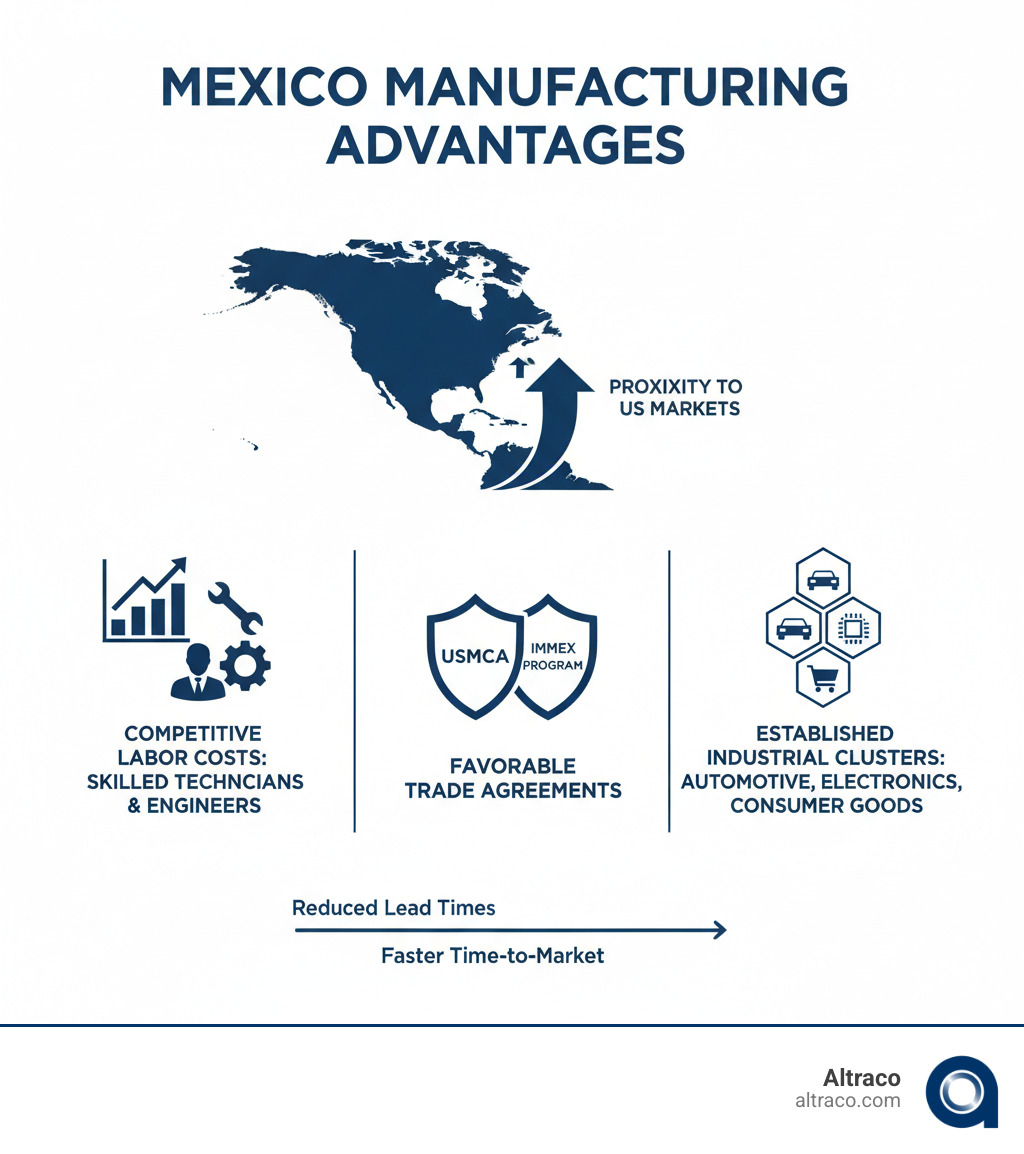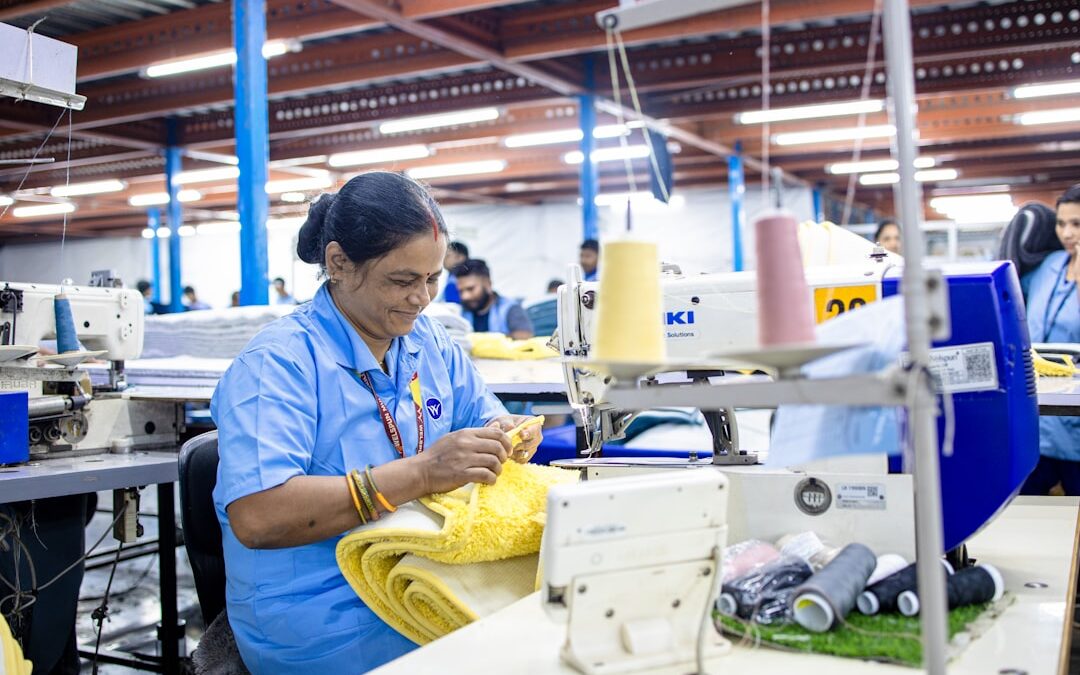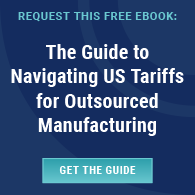Why Mexico Manufacturing is Changing Global Supply Chains
Mexico manufacturing is the cornerstone of North America’s nearshoring revolution, offering a powerful combination of cost savings, proximity, and sophistication for companies moving away from distant offshore production.
Key Benefits of Mexico Manufacturing:
- Proximity: Border access to the world’s largest consumer market.
- Cost Savings: Up to 80% reduction in labor costs compared to U.S. operations.
- Trade Advantages: The USMCA agreement eliminates most tariffs.
- Skilled Workforce: Over 330,000 workers in electronics manufacturing alone.
- Speed to Market: Shipping times are reduced from weeks to days.
Now the 12th largest exporter globally, Mexico is a manufacturing powerhouse producing everything from automotive parts to advanced electronics. Over 5,220 companies operate under the IMMEX program, employing nearly 3 million workers. A record $31 billion in Foreign Direct Investment in the first half of 2024, with over half in manufacturing, highlights a major shift toward supply chain resilience.
For manufacturers of home improvement products, sporting goods, and automotive components, Mexico provides specialized industrial clusters with established supplier networks. The automotive sector contributes 20.2% of Mexico’s GDP, and electronics exports exceeded $87 billion in 2021.
As Albert Brenner, co-owner of Altraco, notes, “With over 40 years in contract manufacturing, I’ve seen Mexico evolve from simple assembly to sophisticated production. Our experience shows that success hinges on choosing the right partners and leveraging the unique advantages of each region.”

Why Companies are Choosing Mexico for Manufacturing
The shift toward Mexico manufacturing is a strategic move by companies recognizing a unique set of advantages. Its proximity to the United States—sharing a 2,000-mile border—is a game-changer for logistics.
With manufacturing in Mexico, shipping times drop from weeks to days, slashing logistics costs and enabling lean, just-in-time inventory management. The labor force offers exceptional value, combining technical skills and engineering expertise with competitive rates.
Mexico’s supportive trade agreements and regulatory framework solidify its role as a reliable partner. This is validated by the record $31 billion in Foreign Direct Investment in the first half of 2024, with over half dedicated to manufacturing. This capital influx demonstrates long-term confidence in Mexico manufacturing.
The Strategic Advantage of USMCA and IMMEX
Two programs, USMCA and IMMEX, offer powerful economic benefits.
The USMCA (United States-Mexico-Canada Agreement) strengthens incentives for North American manufacturing. For example, the automotive sector now requires 75% of vehicle content to originate from North America, creating a massive opportunity for parts manufacturers. A Forbes survey on USMCA’s positive impact found that 78% of auto executives believe it will positively affect their companies.
The IMMEX Program, an evolution of the Maquiladora program, allows companies to import raw materials, components, and machinery into Mexico duty-free and tax-free, provided the finished goods are exported. Over 5,220 companies use IMMEX, employing nearly 3 million people in sophisticated facilities serving major brands.
Mexico vs. China: A Comparative Look
While China was once the default for cost-effective manufacturing, Mexico manufacturing often proves more advantageous for North American markets when considering total landed cost.
Logistics costs highlight the difference. Recent Asia-to-U.S. shipping rates soared to over $18,000 per container, while trucking goods from Mexico costs a fraction of that and takes only days.
| Metric | Mexico | China |
|---|---|---|
| Lead Time | Days to weeks (nearshoring) | Weeks to months (offshoring) |
| Shipping Cost | Significantly lower for North America | High, volatile for North America |
| Labor Rate | Competitive, rising with skill | Generally lower, but rising rapidly |
| IP Risk | Moderate, stronger legal frameworks with USMCA | Higher, enforcement challenges |
| Time Zone | Aligned with North America (real-time communication) | Significant time difference (communication delays) |
While China may have lower base labor rates, Mexico’s savings on transportation, tariffs, and inventory carrying costs often result in a lower total landed cost. Mexico also offers stronger IP protection under USMCA and the significant advantage of aligned time zones, allowing for real-time communication and problem-solving. The quality of manufacturing in Mexico has also improved dramatically, making it the superior choice for many companies serving North American markets.
Key Industries and Geographic Clusters for Mexico Manufacturing
Mexico’s manufacturing landscape is a network of specialized regions, each contributing uniquely to the global supply chain. This strategic development has created some of North America’s most efficient industrial clusters.
Border cities like Tijuana and Ciudad Juarez are built for speed and proximity, specializing in rapid turnaround and just-in-time delivery to U.S. markets.
The Bajio Region—spanning Querétaro, Guanajuato, Aguascalientes, and San Luis Potosi—is one of North America’s most advanced manufacturing corridors, producing everything from precision automotive components to complex electronics. Monterrey complements this as an industrial powerhouse with a diverse manufacturing base. These clusters provide access to established supplier networks, specialized labor, and shared infrastructure, making Mexico manufacturing a compelling alternative to offshoring.
Automotive and Auto Parts
Mexico’s automotive sector is a global leader, representing 20.2% of the country’s GDP. It ranks as the 4th largest exporter of auto parts globally and is the top automotive exporter to the United States. The industry employs over one million people and produces roughly 5 million vehicles annually.
Major automakers like GM, Ford, Nissan, VW, and BMW have extensive operations, particularly in the Bajio region. The industry’s shift toward electric vehicles and next-generation components aligns with the sophisticated supply chain capabilities that benefit our clients. The precision required for automotive parts translates directly to high-quality components for outdoor equipment and sporting goods. You can learn more about how we leverage these capabilities on our services page.
Electronics, Home Improvement, and Outdoor Products
Electronics manufacturing is a rising star, with Mexico being the 6th largest electronics manufacturer in the world. The industry includes over 1,100 companies employing around 330,000 people.
Guadalajara, known as “Mexico’s Silicon Valley,” is a hub with 12 original equipment manufacturers and over 380 specialized suppliers, exporting approximately $150 billion annually. This ecosystem supports a vast range of products, from smart home devices to advanced controls for outdoor equipment. This expertise, combined with strengths in metal fabrication and materials processing, makes Mexico ideal for producing durable home improvement products and high-quality sporting goods. The combination of a skilled workforce, established supply chains, and competitive pricing creates a powerful manufacturing advantage.
Navigating Operational Models and Labor
Mexico offers flexible operational pathways for companies of all sizes, supported by a skilled and motivated workforce. The country’s investment in technical schools and engineering programs has created a deep talent pool of capable engineers, technicians, and supervisors.
Labor costs in Mexico can offer up to 80% savings compared to the U.S., but the true advantage is value. This comes from a combination of competitive wages, strong technical skills, and significantly lower turnover rates, ensuring production consistency and high quality.
Operational models are designed to fit your investment capacity and desired level of control:
- Contract manufacturing allows you to leverage existing Mexican facilities and expertise, ideal for testing the market.
- Shelter services offer a “soft landing” where a partner handles administrative tasks (HR, accounting, compliance) while you control production and quality.
- Joint ventures involve sharing risks and capital with a local partner.
- Wholly-owned subsidiaries provide complete control but require the highest investment and regulatory knowledge.
Choosing Your Entry Strategy
The right entry strategy depends on your desired control, risk tolerance, and capital. Contract manufacturing is a low-risk entry point, but finding a reliable partner is key. Shelter services are popular with mid-sized companies that want direct oversight without the administrative burden. Joint ventures and wholly-owned subsidiaries are for companies ready to make a significant commitment.
Our role is to help you weigh these options against your business objectives. We analyze your capital, control needs, and risk profile to build a strategy that ensures your success. You can explore more of these strategic considerations on our insights page.
Understanding the Benefits of Mexico Manufacturing Labor
Mexico’s workforce is a primary asset. The government’s focus on technical training has produced a steady pipeline of qualified workers for complex manufacturing in sectors like automotive, electronics, and sporting goods.
The cost-to-skill ratio is impressive. While wages are rising, they remain highly competitive. Crucially, lower turnover rates compared to other global regions lead to greater stability, consistent quality, and increased productivity. This allows our clients to achieve high-quality output while benefiting from a competitive cost structure, whether for precision automotive parts or durable outdoor equipment.
Overcoming Challenges in the Mexican Manufacturing Landscape
While Mexico manufacturing offers immense advantages, navigating its challenges is key to success. With four decades of experience, we know that success comes from effectively steering around obstacles, not avoiding them.
Common concerns include security, intellectual property (IP) protection, and bureaucracy. The reality on the ground, however, is often different from media headlines.
Mitigating Risks: Security and IP Protection
Our approach focuses on proactive due diligence and protection.
Security begins with location. We partner exclusively with manufacturers in established, secure industrial parks featuring controlled access, surveillance, and professional security. These secure business communities protect assets and proprietary designs, and often correlate with higher quality standards.
Intellectual property protection requires a multi-layered strategy. This includes registering trademarks and patents in Mexico, establishing clear contractual agreements, and working with legal experts. The USMCA has significantly strengthened IP protections and enforcement mechanisms. We also help structure manufacturing relationships to protect sensitive information, such as limiting access to complete specifications.
A Realistic Look at Mexico Manufacturing Challenges
Every manufacturing destination has a learning curve. We believe in addressing challenges head-on.
- Infrastructure: Quality can vary by region. Major hubs like the Bajio region and Monterrey have world-class infrastructure, but other areas may have inconsistent utilities. Careful site selection is critical.
- Customs and Logistics: Despite proximity, cross-border logistics can be complex. Proper documentation and experienced logistics partners are essential to avoid delays.
- Business Culture: Mexican business culture often emphasizes relationship-building, which can differ from more direct American styles. Language barriers can also create misunderstandings if not managed properly.
- Finding the Right Partner: Identifying a manufacturer that understands international quality and communication standards is perhaps the biggest challenge. Many excellent facilities primarily serve domestic markets.
The key to overcoming these problems is working with experienced partners. We bridge these gaps, connecting clients with vetted manufacturers and managing the logistics and communication that make Mexico manufacturing successful.
Frequently Asked Questions about Manufacturing in Mexico
After decades of helping companies with Mexico manufacturing, we’ve compiled answers to the most common questions.
What are the primary benefits of manufacturing in Mexico?
The main advantages are significant labor cost savings (up to 80% vs. the U.S.), drastically reduced logistics expenses and lead times due to proximity, access to a large and skilled workforce, and favorable trade conditions under the USMCA. This allows for just-in-time manufacturing and greater supply chain resilience.
Which industries are most successful in Mexico?
Mexico excels in complex, high-value production. The most prominent industries are automotive, where it’s a top global exporter of parts, and electronics, with Guadalajara known as “Mexico’s Silicon Valley.” The country also has exceptional capabilities for manufacturing home improvement, sporting goods, and outdoor products due to its strengths in metal mechanics and precision assembly.
What is the IMMEX/Maquiladora program?
The IMMEX program (formerly the Maquiladora program) is a government initiative that allows foreign companies to import raw materials, components, and equipment into Mexico tax- and duty-free. The condition is that the finished products must be exported. This program dramatically reduces production costs and makes Mexican goods highly competitive. Over 5,220 companies employing nearly 3 million people operate under IMMEX, making it a cornerstone of Mexico’s manufacturing success.
Conclusion: Your Next Step Towards Manufacturing in Mexico
The global manufacturing landscape is undergoing a fundamental shift, and Mexico manufacturing is at the forefront. The nearshoring trend is driven by a strategic move toward supply chain resilience, and Mexico’s combination of cost savings, proximity, and sophisticated capabilities makes it the clear choice for smart manufacturers.
Mexico is rapidly embracing advanced manufacturing technologies like robotics, automation, and 3D printing, positioning itself as a modern industrial powerhouse. For companies in home improvement, sporting goods, automotive parts, and outdoor equipment, this means access to world-class production at a competitive cost.
At Altraco, we simplify global manufacturing. Our decades of experience in Mexico, China, and Vietnam provide the perspective to help you make the right choice for your products. Based in Thousand Oaks, California, we bridge North American companies with exceptional manufacturing partners, handling tariff navigation, quality control, and cultural barriers.
The future of Mexico manufacturing is bright. The infrastructure, skilled workforce, and favorable trade agreements are in place. The time to explore the opportunities is now.
Ready to take the next step? We’re here to help you steer this exciting landscape.
Contact us about Mexico manufacturing companies in California.





